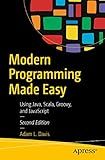Best Groovy Programming Guides to Buy in March 2026

Groovy in Action: Covers Groovy 2.4



Programming Groovy 2: Dynamic Productivity for the Java Developer (Pragmatic Programmers)



Groovy Programming: An Introduction for Java Developers



Making Java Groovy
- AFFORDABLE PRICES ON QUALITY BOOKS-SAVE MONEY WHILE READING!
- ECO-FRIENDLY CHOICE: REDUCE WASTE BY CHOOSING USED OVER NEW.
- UNIQUE FINDS: DISCOVER OUT-OF-PRINT TITLES AND HIDDEN GEMS!



Groovy in Action
- DISPATCH SAME DAY FOR ORDERS BEFORE 12 NOON!
- MINT CONDITION ENSURES TOP-QUALITY EVERY TIME.
- HASSLE-FREE RETURNS GUARANTEE CUSTOMER SATISFACTION.



Modern Programming Made Easy: Using Java, Scala, Groovy, and JavaScript



Programming Groovy: Dynamic Productivity for the Java Developer (The Pragmatic Programmers)
- AFFORDABLE PRICES FOR QUALITY READING MATERIALS.
- ECO-FRIENDLY CHOICE: SAVE BOOKS FROM LANDFILLS.
- GRADUAL WEAR REFLECTS UNIQUE CHARACTER AND CHARM.



Groovy Recipes: Greasing the Wheels of Java



Groovy: Grundlagen und fortgeschrittene Techniken (German Edition)


In Groovy, you can pass optional query parameters by using named arguments in the method call. When calling a method that accepts query parameters, you can provide the optional parameters as key-value pairs in the method call. This way, you can pass only the necessary parameters and leave out the optional ones.
For example, if you have a method search that accepts query parameters like type and filter, you can call it with optional parameters like this:
search(type: 'book')
In this example, we are only passing the type parameter and leaving out the filter parameter. Groovy allows you to pass named arguments in any order, so you can specify only the parameters that you want to pass.
By using named arguments in method calls, you can easily pass optional query parameters in Groovy and make your code more readable and flexible.
How to serialize query parameters in a Groovy POST request?
To serialize query parameters in a Groovy POST request, you can use the URIBuilder class from the Apache HttpComponents library. Here is an example of how you can serialize query parameters in a Groovy POST request:
- Add the Apache HttpComponents library to your project. You can do this by adding the following dependency to your build.gradle file:
dependencies { implementation 'org.apache.httpcomponents:httpclient:4.5.13' }
- Create a method that makes a POST request with query parameters serialized in the request body:
import org.apache.http.client.methods.HttpPost import org.apache.http.client.utils.URIBuilder import org.apache.http.entity.StringEntity import org.apache.http.impl.client.CloseableHttpClient import org.apache.http.impl.client.HttpClients
def makePostRequestWithQueryParams(String url, Map queryParams) { CloseableHttpClient client = HttpClients.createDefault()
URIBuilder builder = new URIBuilder(url)
queryParams.each { key, value ->
builder.setParameter(key, value)
}
HttpPost post = new HttpPost(builder.build())
post.setHeader('Content-Type', 'application/json')
// Add any request body if needed
// post.setEntity(new StringEntity('{"key": "value"}'))
client.execute(post)
}
- Call the method with the URL and the query parameters you want to include in the request:
def queryParams = [param1: 'value1', param2: 'value2'] makePostRequestWithQueryParams('http://example.com/api', queryParams)
This will serialize the queryParams map into query parameters and include them in the request URL.
How to combine query parameters with path parameters in Groovy?
To combine query parameters with path parameters in Groovy, you can use the UriBuilder class from the groovy.net package. Here is an example of how to do this:
@Grab(group='org.codehaus.groovy.modules.http-builder', module='http-builder', version='0.7.1') import groovyx.net.http.*
def baseUri = 'https://api.example.com' def path = '/users' def queryParameters = [ 'page': 1, 'limit': 10 ]
def uri = new URIBuilder(baseUri) .setPath(path) .setParameters(queryParameters.collect { new BasicNameValuePair(it.key, it.value as String) }) .build()
println uri
In this example, we first define the base URI, the path, and the query parameters. We then use the URIBuilder class to construct the complete URI by setting the base URI, path, and query parameters. Finally, we build the URI and print it out.
This will result in a URI like https://api.example.com/users?page=1&limit=10, where the query parameters are combined with the path parameters.
How to parse query parameters in a Groovy request object?
You can parse query parameters in a Groovy request object by accessing the parameters property of the request object. Here's an example on how to do this:
import spark.Spark.*
get("/example", (req, res) -> { def queryParams = req.parameters()
queryParams.each { key, value ->
println("Query parameter key: ${key}, value: ${value}")
}
// You can access specific query parameters like this
def param1 = queryParams.param1
def param2 = queryParams.param2
println("Value of param1: ${param1}")
println("Value of param2: ${param2}")
return "Query parameters parsed successfully."
})
In the above example, we define a route /example that handles GET requests. Inside the route handler, we access the parameters property of the request object req to get all the query parameters passed with the request. We then iterate over the query parameters map and access specific query parameters by key.
You can test this by making a GET request to http://localhost:4567/example?param1=value1¶m2=value2, and you should see the parsed query parameters printed in the console output.
